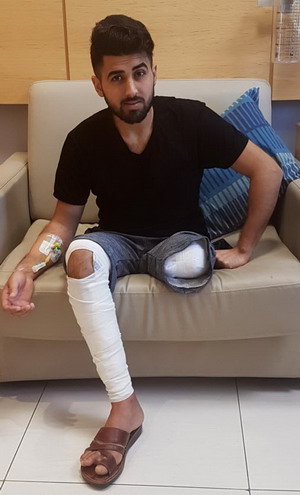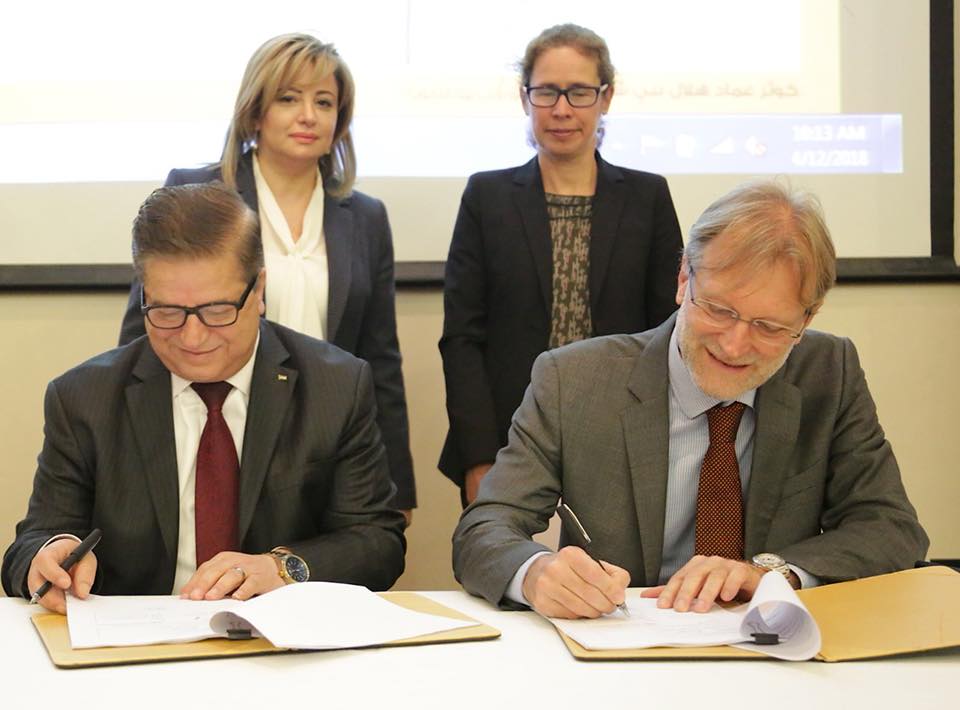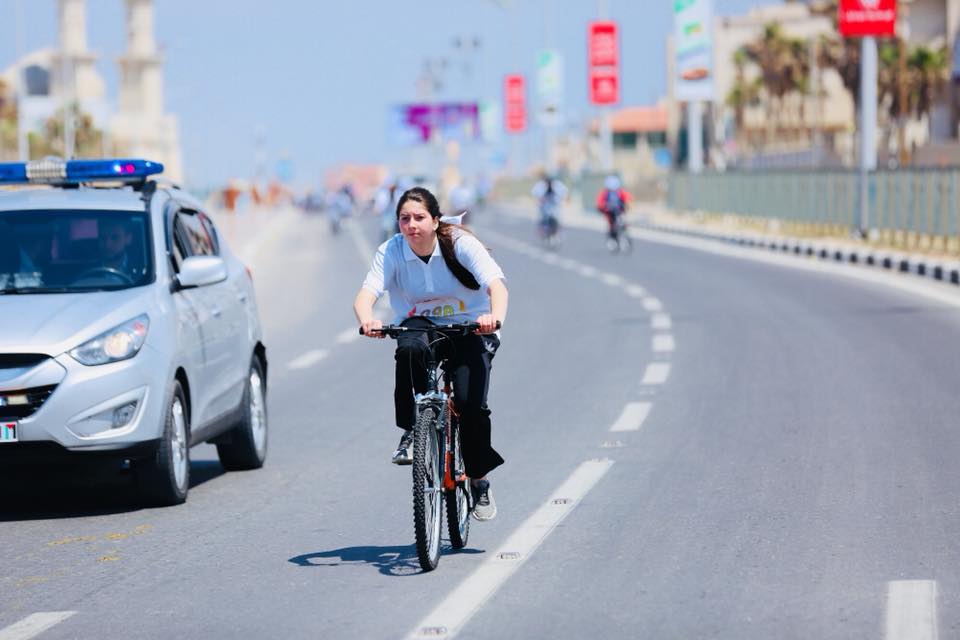WHO talks to Yousef, journalist shot in leg during protests, after referral out of Gaza
 In spite of clearly identifying himself as a journalist, Yousef received bullet wounds to both legs during protests in Gaza. Surgeons operated successfully on Yousef’s right leg at Shifa Hospital, but they were unable to save his left leg and on 9 April Yousef had an above-knee amputation26 April 2018 – After a first meeting on 11 April, WHO met again with Yousef after his referral out of Gaza to Istishari Arab Hospital in Ramallah in the West Bank. Yousef was transferred to Shifa Hospital in Gaza after he was shot during protests on 30 March. Yousef is studying Media Studies and Public Relations at Al Azhar University in Gaza and he attended the first demonstrations on 30 March east of Al Bureij refugee camp as a photojournalist. He was wearing a vest that clearly marked him as ‘PRESS’ when he was shot in both legs. Surgeons managed to save Yousef’s right leg, but on 9 April he had an above knee amputation to his left leg.
In spite of clearly identifying himself as a journalist, Yousef received bullet wounds to both legs during protests in Gaza. Surgeons operated successfully on Yousef’s right leg at Shifa Hospital, but they were unable to save his left leg and on 9 April Yousef had an above-knee amputation26 April 2018 – After a first meeting on 11 April, WHO met again with Yousef after his referral out of Gaza to Istishari Arab Hospital in Ramallah in the West Bank. Yousef was transferred to Shifa Hospital in Gaza after he was shot during protests on 30 March. Yousef is studying Media Studies and Public Relations at Al Azhar University in Gaza and he attended the first demonstrations on 30 March east of Al Bureij refugee camp as a photojournalist. He was wearing a vest that clearly marked him as ‘PRESS’ when he was shot in both legs. Surgeons managed to save Yousef’s right leg, but on 9 April he had an above knee amputation to his left leg.
“You know, when I first woke up I still had hope that both my legs would be saved and I would return to my normal life. I was absolutely devastated when they decided to amputate my leg.”
After WHO met Yousef in Gaza he was discharged from hospital on 12 April. On 16 April Yousef’s appeal through Al Mezan Center for Human Rights to the Supreme Court in Israel was upheld and he was granted a permit to travel to Istishari Arab Hospital in Ramallah. Yousef describes the process of having to apply for a permit to travel:
“Of course it was stressful. My father and uncles were going every day to follow up on the application with the Coordination and Liaison Office and human rights organizations, including Al Mezan Center for Human Rights. Finally I was given a permit to travel, but 12 of my relatives – my dad, my mum, my siblings and some uncles – were all refused permits to travel with me. In the end my grandfather of 85 years has come with me. Our family is paying for him to stay in an apartment near the hospital. My cousin is from Hebron and he comes to see me too.”
When WHO met Yousef in Gaza he was one of 6 patients who had applied to Israeli authorities for a permit to travel for health care. At that stage, all permit applications had so far been unsuccessful. Following the Supreme Court decision on 16 April, patient permit applications to exit Gaza were approved. As of 24 April, 9 out of 20 applications by patients injured in protests since 30 March in Gaza were approved and 11 denied.
Immediately after receiving his approval to travel, Yousef went by ambulance to Erez checkpoint, to exit the Gaza Strip to Israel and onto Istishari Arab Hospital in the West Bank. They were kept waiting at Erez for 2 and a half hours and Yousef was searched before being transferred to another ambulance on the Israeli side.
Yousef talks about his hopes for the future: “I still want to become a photojournalist and to finish my studies, but right now my main priority is to get an artificial limb so that I can walk again … I’m realistic. When things are bad I recognize they’re bad. When things are getting better, they’re getting better. I’m used to being my own support.”
Related link
Journalist denied exit from Gaza for health care loses his left leg from a gunshot wound
15 April 2018
WHO concerned over increasingly overwhelmed health services in the Gaza Strip
 17 April 2018, Gaza – Mass demonstrations in Gaza have left at least 33 Palestinians dead and more than 4279 injured since 30 March, according to the Palestinian Ministry of Health. The escalating violence has also led to the injury of 41 health staff, of whom 3 were injured by bullets, with 13 ambulances damaged by bullets and tear gas.
17 April 2018, Gaza – Mass demonstrations in Gaza have left at least 33 Palestinians dead and more than 4279 injured since 30 March, according to the Palestinian Ministry of Health. The escalating violence has also led to the injury of 41 health staff, of whom 3 were injured by bullets, with 13 ambulances damaged by bullets and tear gas.
“The deteriorating humanitarian situation is extremely worrying. Hospitals in Gaza are overwhelmed with the influx of injured patients. With further escalations expected during the coming weeks, the increasing numbers of injured patients requiring urgent medical care is likely to devastate Gaza’s already weakened health system, placing even more lives at risk,’ said Dr Gerald Rockenschaub, WHO’s Head of Office for the West Bank and Gaza.
“We are especially concerned over the impact of the violence on health care workers and ambulances, especially in this current context,” added Dr Rockenschaub. “Health services in Gaza are already extremely limited due to chronic shortages of medicines, medical disposables, and inadequate supplies of electricity and fuel for emergency generators in hospitals.”
In response to increasing health needs, the Palestinian Ministry of Health has established 5 medical camps equipped with emergency supplies to stabilize injuries before referring them to nearby hospitals. The medical camps are staffed with up to 10 doctors and 15 nurses, supported by volunteers, and ambulances are on stand-by. Each camp is equipped with first aid medication, and had 3-4 beds; mattresses were also used to support the increasing number of casualties. They are complemented by 5 advanced medical posts managed by the Palestinian Red Crescent Society. An additional 5 primary health centres were opened to provide support.
However, shortages of medicines and medical supplies are impeding the ability of health authorities to effectively respond to the immediate needs of casualties. The Palestinian Ministry of Health and health partners need urgently to replenish 75 types of essential medicines, 190 types of essential medical disposables.
To fill critical gaps, WHO and health partners are currently in the process of delivering 10 types of essential medicines and 16 types of medical disposables to meet emergency medical needs.
“WHO continues to monitor the situation and identify urgent health needs that are required to save lives. However, without additional funding for trauma and surgical medicines and supplies, very little can be done. WHO and health partners urgently require US$ 4.4 million to respond to immediate emergency needs in Gaza. Further funding will be needed for emergency preparedness and response over the comings weeks as the demonstrations and clashes continue,” said Dr Rockenschaub.
Situation report
Health worker shot in the leg during Gaza demonstrations, April 2018

April 2018, Gaza –Imad is 34 and has been volunteering as a first responder with the Palestinian Red Crescent Society (PRCS) since 2006. On Monday 9 April 2018, Imad volunteered with PRCS east of al Bureij refugee camp in the Middle Area of the Gaza Strip. Imad was waiting as part of the PRCS team, sitting in the front passenger seat of an ambulance beyond the 300-metre zone.
“Just after 5 o’clock there was suddenly shooting from the barrier and I was hit in my right leg. We got out of the ambulance straight away and went to hide behind it [on the opposite side from the Gaza barrier]. At this point the paramedics who were with me put a bandage on my leg to stem the bleeding and then they got me into the ambulance and moved me to Al Aqsa Hospital in Deir Al-Balah. I was in Al Aqsa Hospital for about 30 minutes to receive first aid and then I was moved to Al-Quds Hospital in Gaza City. From there they transferred me to Shifa Hospital after the doctors diagnosed me with compartment syndrome [bleeding into the calf of the leg that then cuts off the blood supply to the leg]. In Shifa I had surgery. Doctors told me that if I hadn’t been able to have this surgery I would have lost my leg.”
Imad has been volunteering with PRCS for more than 10 years. He reports that the teams he works with are often exposed to tear gas and he himself has previously sustained some minor injuries. However, Imad remains committed to volunteering with the ambulances and first responders.
“We need humanitarian workers in this difficult situation. Gaza has been exposed to three wars in 6 years. Life here is a constant emergency. Working with PRCS to help the sick and injured, you feel at least that you are able to improve things in some small way.”
Imad graduated in English from Al-Azhar University in Gaza in 2008. He works intermittently as an emergency trainer for the PRCS and other organizations. He is married and has 2 young children.
Now Imad is recovering from this initial operation at Al Quds Hospital in Gaza City. He is due for a second operation to remove the bullet, which is still lodged in his right calf muscle, and to fix a fracture. “After I complete my treatment and get better, I’m aiming to go back to working with the ambulances. For me, it’s a duty that I feel to our patients and to Gaza.”
Health for all: Celebrating World Health Day and launch of project for Universal Health Coverage, April 2018
World Health Day and Universal Health Coverage
 April 2018, oPt – The Palestinian Ministry of Health, together with WHO in the occupied Palestinian territory and the Palestinian National Institute of Public Health, celebrated World Health Day with two events in the West Bank and Gaza to raise awareness about the importance of Universal Health Coverage (UHC) to ensure ‘Health for All’ in the 21st century.
April 2018, oPt – The Palestinian Ministry of Health, together with WHO in the occupied Palestinian territory and the Palestinian National Institute of Public Health, celebrated World Health Day with two events in the West Bank and Gaza to raise awareness about the importance of Universal Health Coverage (UHC) to ensure ‘Health for All’ in the 21st century.
World Health Day marks the founding of the World Health Organization on 7th April 1948, with 2018 the 70th anniversary of the organization. Each year, WHO tries to focus attention on important health topics to raise public awareness. This year the theme was Universal Health Coverage (UHC), which aims to ensure access to health services for all without facing financial hardship. UHC promotes improved health system management and tries to ensure the availability of essential medicines and technologies for the diagnosis and treatment, as well as the training of sufficient numbers of health personnel to provide care. UHC is also an important component of sustainable development, poverty reduction and an essential component of efforts to reduce inequities in society.
Ramallah, West Bank, occupied Palestinian territory
In Ramallah, participants from across the health sector came together to celebrate World Health Day, in commitment to achieving Universal Health Coverage and Health for All in the occupied Palestinian territory. There were speeches and presentations, with opening remarks from Dr Jawad Awad, the Palestinian Minister of Health, Dr Marina Wes, Country Director for the World Bank, and Dr Gerald Rockenschaub, Head of WHO Office in the occupied Palestinian territory. The Palestinian Ministry of Health, WHO, the World Bank and the Palestinian National Institute of Public Health launched a joint Universal Health Coverage project for the occupied Palestinian territory.
Gaza City, occupied Palestinian territory
 In Gaza, participants from the Ministry of Health, UNRWA, health cluster, human rights organizations, academic institutions and UN agencies joined events to celebrate World Health Day, with talks and a panel discussion on the challenges for Universal Health Coverage in Gaza, presentation of a short video, a theatre performance and a public bike race with more than 250 participants.
In Gaza, participants from the Ministry of Health, UNRWA, health cluster, human rights organizations, academic institutions and UN agencies joined events to celebrate World Health Day, with talks and a panel discussion on the challenges for Universal Health Coverage in Gaza, presentation of a short video, a theatre performance and a public bike race with more than 250 participants.
Regional art competition for World Health Day
In the West Bank and Gaza, the day concluded a regional art competition for schoolchildren aged 8–18 years conducted for the whole WHO Eastern Mediterranean Region, which includes 22 countries. A panel of judges selected drawings from across the region, with a Palestinian student from Rafah winning 4th place in the 14-15 year old age group. All students were applauded for their excellent contributions, with an exhibition of the entries on display during both events.
Commitment to Universal Health Coverage
Dr Jawad Awad, Palestinian Minister of Health, reiterated the commitment of the Ministry of Health to achieving Universal Health Coverage for all Palestinians. He welcomed the coming project for the Universal Health Coverage that represents a partnership between the Palestinian Ministry of Health, WHO, the World Bank and the Palestinian National Institute of Public Health.
Dr Gerald Rockenschaub, Head of WHO Office in the occupied Palestinian territory, stated: "There are evidently major barriers to achieving Universal Health Coverage for Palestinians in the West Bank and Gaza, who continue to experience the effects of on-going occupation and the impact that this has for access to health services, their availability and affordability. This new initiative in partnership with the World Bank and Palestinian National Institute for Public Health, and in conjunction with the Palestinian Ministry of Health, is an important step to broadening Universal Health Coverage to promote Health for All Palestinians in the occupied Palestinian territory.”








